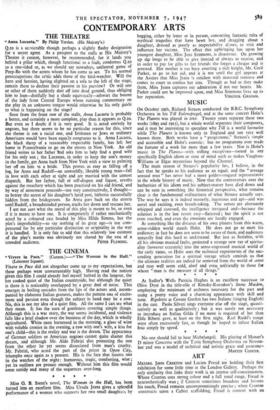THE CINEMA
" Vivere in Pace." (Curzon.)—" The Woman in the Hall." (Leicester Square).
Vivere in Pace did not altogether come up to my expectations, but these perhaps were unwarrantably high. Having read the notices given this film I could already feel myself bathed in the langour, the hot cooked quiet of the Italian countryside, but although the quiet is there it is noticeably overlapped by a great deal of noise. This emerges in boiling cascades from the lips of the actors and, accom- panied by elaborate Italian gestures, makes the pattern one of excite- ment and passion even though the subject in hand may be a cow. No, this is not my idea of a quiet film. All the same I can see what they mean. It has the aura of gentleness covering simple things. Although this is a war story, the war seems incidental, and violence falls like a brief shadow over the business of the day, which is wholly agricultural. White oxen harnessed in the morning, a glass• of wine with voluble cronies in the evening, a row with one's wife, a kiss for one's child—this is the reality and war is the dream. The appearance of German soldiers or American negroes cannot quite shatter this dream, and although Mr. Aldo Fabrizi dies protecting the one from the other he yet seems dissociated from man's cruelty. Mr. Fabrizi, who acted the part of the priest in Open City, triumphs once again as a peasant. His is the face that haunts one in the watches of the night: humorous, tragic, comforting, wise ; yet its outlines are prosaic enough. Without him this film would seem untidy and many of the sequences over-long.
* * * *
Miss G. B. Stern's novel, The Woman in the Hall, has been turned into an excellent film. Miss Ursula Jeans gives a splendid performance of a woman who supports her two small daughters by
begging, either by letter or in person, concocting fantastic tales of mythical tragedies that have beset her, and dragging about a daughter, dressed as poorly as respectability al:ows, to visit and influence her victims. The effect this upbringing has upon her youngest daughter, Miss Jean Simmons, is disastrous. On growing up she longs to be able to give instead of always to receive, and in order to pay for gifts to her friends she forges a cheque and is arrested. Her mother is too busy courting a rich knight, Mr. Cecil Parker, to go to her aid, and it is not until the girl appears at the Assizes that Miss Jeans is stricken with maternal remorse and comes to court to confess her sins. Though as bad as they make them, Miss Jeans captures our admiration if not our hearts. Mr. Parker could not be improved upon, and Miss Simmons lives up to


































 Previous page
Previous page